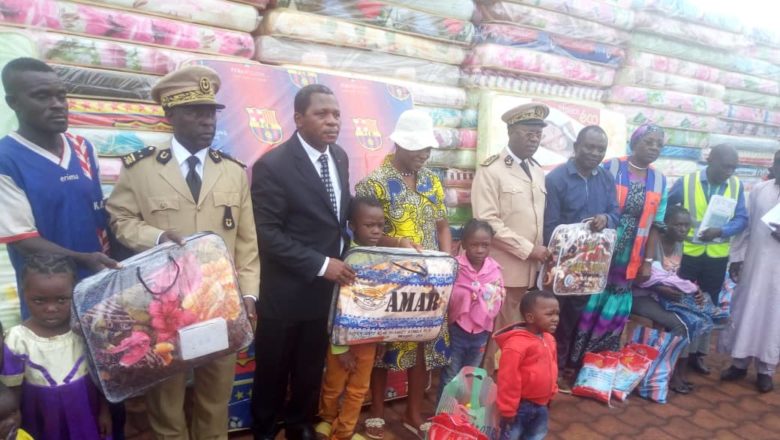
In Cameroon’s anglophone regions, humanitarian workers are increasingly caught up in the country’s separatist conflict, facing threats and violence from both sides as they struggle to deliver aid.
Looting of convoys, attacks on food handouts, even kidnapping: all are part of the risks to aid workers in Cameroon’s troubled Northwest and Southwest regions, where thousands have been displaced by fighting between separatist rebels and the military since 2017.
Three food distributions were halted in one week alone recently, according to witnesses who spoke to AFP by telephone.
A man aged 29 was shot by soldiers at Ekona village in Southwest Region as people gathered on February 19 to receive rice and other rations from the World Food Programme (WFP), the UN agency and villagers said.
Ten soldiers sorted 220 internally displaced people by gender and age, said a witness who “hid for my life” in grass nearby.
Cameroon. By (AFP)
“They beat up everybody and took with them seven of the young guys inside one class of the primary school where they were supposed to do the distribution. They started intimidating the guys, (claiming) that they are separatists,” said the witness, who asked not to be named.
The soldiers pulled a young man out of the group and shot him in the groin, the witness said.
“He bled to death before the eyes of the military and everyone was there watching helplessly,” he added.
His account was confirmed by another villager and a regional NGO.
The two regions are home to Cameroon’s large anglophone minority, who account for nearly a fifth of the population of 24 million.
Years of grievances at perceived discrimination snowballed into a declaration of independence in October 2017, which was followed by a government crackdown.
The conflict has claimed more than 3,000 lives and forced almost 700,000 people to flee their homes. Health centres and schools have closed, while whole villages have been burned down.
Army denial
Rights monitors have said separatist rebels and the army are both guilty of atrocities or abuses. Sources say they have carried out attacks on, or disrupted, humanitarian aid.
Army spokesman Colonel Cyrille Atonfack Guemo dismissed reports of military brutality as “attempts at disinformation” aimed at “tarnishing the image of our forces”.
“It is inconceivable that the army, whose mission is to work to improve living conditions… should at the same time oppose the work of humanitarian organisations,” the colonel said.
Witnesses said the same soldiers who disrupted food distribution at Ekona had been there before, on December 24.
The troops arrested a humanitarian volunteer and took him to a police station.
“His body, with signs of torture, was found in early January in the bush about 30 kilometres (19 miles) away,” said one witness, whose account was backed up by an aid worker who asked for anonymity.
Armed police on duty at a party political meeting in the troubled west of Cameroon. By MARCO LONGARI (AFP/File)
Humanitarian personnel can feel “caught between two forces, finding yourself on a very fine line,” said Ayah Abine, president of the Ayah Foundation, a Cameroonian NGO.
Soldiers often move in just after humanitarian deliveries, if not during them, while the “ambas” — secessionist fighters — will threaten or kidnap NGO staff if they suspect them of working for the government.
On February 20, an armed group intervened during a food distribution by Caritas at Bafmeng in Northwest Region.
About 50 children and 20 adults had to scramble for safety in the lorry used by the NGO before it sped away from the scene, according to the Caritas director in Cameroon, Father Paul Njokikang.
The priest added that he had been taken hostage three times by separatist groups during humanitarian operations and detained for 24 hours by the army.
Harassment and worse does not spare medical aid. On February 19, soldiers pursued a car on the grounds of a hospital supported by Doctors Without Borders (MSF) in the Northwest Region.
As both vehicles stopped in the ambulance parking zone, one soldier opened fire and killed the driver, MSF said.
“The soldier who fired the shots was immediately arrested” and an inquiry was ordered at once “and is underway”, according to the defence ministry.
‘Total fear’
Abine, of the Ayah Foundation, said he had been “almost shot by the military” but was “saved by grace”, while armed groups had kidnapped members of his NGO three times.
On February 20, he was picked up by gendarmerie police in Cameroon’s capital Yaounde on suspicion of delivering weapons to the separatists, before being released without charge.
Several officials working for international NGOs told AFP that the Ayah Foundation was a neutral party in the conflict. “This is intimidation,” one official said.
For the army, Atonfack voiced “distrust regarding certain humanitarian organisations, whose acts sow doubts about their integrity… Ambulances belonging to MSF have been found transporting armed fighters as well as arms and ammunition.”
A market day in Buea. By MARCO LONGARI (AFP/File)
“Doctors Without Borders categorically refutes these serious allegations that endanger our patients and teams,” MSF said in a statement.
“Our ambulances are only used to transport unarmed patients in need of immediate medical care, regardless of their ethnicity, gender, religious or political beliefs.”
“A large number of incidents concerning aid workers are reported, looted convoys, kidnappings … yet the aid is already less than needed,” said Jerome Fontana, head of operations for the International Committee of the Red Cross (ICRC) in Cameroon.
“We’re living in total fear, inside the bushes with wild animals,” an Ekona villager said from hiding. “Can you imagine, madam, little babies, women giving birth inside the bush?”
Only 32.17 percent of the UN humanitarian targets for the two regions were met in 2019. “The main obstacle isn’t financial,” Fontana said, “it’s security.”
Source: Modernghana.com